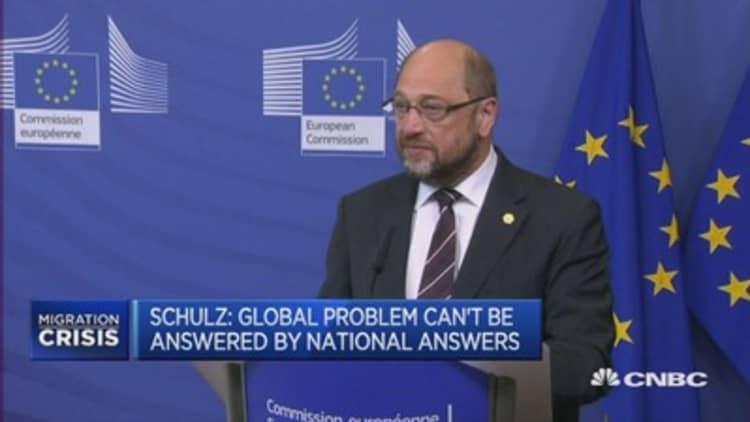Berlin on Tuesday agreed measures aimed at curbing an unprecedented surge in migrants, including cuts to cash payments, as a backlash grew over the German government's handling of the refugee crisis.
The new laws are aimed at lifting some of the pressures on overworked local officials and reassuring voters that the government is in control of the migrant problem. Berlin wants the laws to take effect as soon as November.
Chancellor Angela Merkel has come under mounting pressure, including from within her own CDU/CSU coalition, since she pledged to set "no upper limit" on the right to asylum and promised to accept all refugees from Syria. Officials expects 800,000 refugees this year, four times more than 2014.
In a surprise development, Joachim Gauck, German president, who is widely viewed as a liberal, on Sunday launched a thinly veiled attack on Ms Merkel's handling of the crisis, saying: "Our reception capacity is limited even when it has not yet been worked out where these limits lie."
Cash handouts of 143 euros a month for a single person are seen as making Germany more desirable for migrants than other European states. Refugees will instead receive non-cash benefits, such as food vouchers. Cash payments for living expenses will largely be stopped for asylum-seekers living in official reception centres.

Berlin will also add Kosovo, Albania and Montenegro to a list of countries where would-be refugees can be safely returned in an attempt to staunch inflows of economic migrants from the western Balkans. Failed asylum-seekers will face more rapid removal procedures and big cuts in financial support.
However, successful applicants will have quicker access to language courses to improve integration into society and the jobs market. Berlin pledged to double its refugee-linked support for regional and local authorities to 2 billion euros this year, rising to about 4 billion euros in 2016, assuming refugee inflows of 800,000 annually.
More from the Financial Times:
Migration crisis tests German minister
Head of Germany's migrant office quits
German system creaks under refugee influx
Pro-refugee groups protested that the new rules would impose more stresses on overburdened refugee centres, where fights have broken out between different ethnic and religious groups. One incident in Kassel, western Germany, left 14 injured after a brawl involving 370.
The Migration Council, a refugee-orientated umbrella body, said the government was basing its policies on "frightening off and shutting away" migrants.
Thomas Strobl, a parliamentary group deputy leader from Ms Merkel's CDU party, urged migrants to think before leaving their homelands.
"The message is: don't sell your house or your car because you will be back where you came from in a very short time."
Read MoreEurope to relocate 120,000 migrants: Reports
CDU MPs said their constituents did not necessarily support the public welcome given to refugees at Munich railway station where they have arrived in Germany.
Opinion polls are showing weakening support for the CDU/CSU bloc, with a survey for Bild, the top-selling newspaper, on Tuesday showing a 1 percentage point fall to 38.5 per cent, after a 0.5 percentage point drop the previous week.
Support for the CDU/CSU it at its lowest level since the height of the Ukraine crisis, although this still leaves the conservatives well ahead of the social democrats, their coalition partners, on 23.5 per cent. But among CDU/CSU MPs anything below 40 per cent prompts grumbles.

